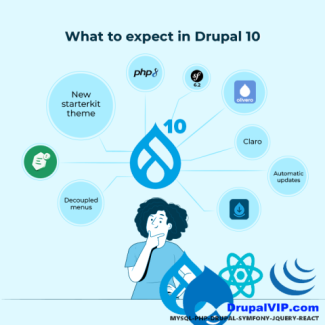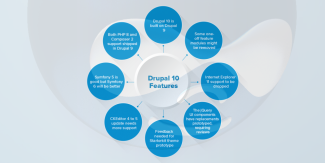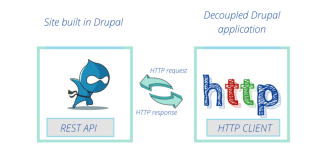RESTful Web Services
Displaying 1 - 3 of 3ResourceResponse When and How
class ResourceResponse
Contains data for serialization before sending the response.
We do not want to abuse the $content property on the Response class to store our response data.
$content implies that the provided data must either be a string or an object with a __toString() method, which is not a requirement for data used here.
Routes that return this response must specify the '_format' requirement.
Code Snippet
$response = ['message' => 'Hello, this is a rest service'];
return new ResourceResponse($response);use Symfony\Component\HttpFoundation\Response;
$response = new Response(
'Content',
Response::HTTP_OK,
['content-type' => 'text/html']
);
$response->setContent('Hello World');
// the headers public attribute is a ResponseHeaderBag
$response->headers->set('Content-Type', 'text/plain');
$response->setStatusCode(Response::HTTP_NOT_FOUND);Requests and Responses the Drupal way
HTTP is all about requests and responses.
Drupal represents the responses it sends as Response objects.
Drupal’s responses are Symfony Response objects.
Symfony’s documentation also applies to Drupal.
Code Snippet
RESTful Example using jQuery and core REST module
CREATE Item
var package = {}
package.title = [{'value':'t1'}]
package.body = [{'value':'b1'}]
package._links = {"type":{"href":"http://local.drupal8.org/rest/type/node/page"}}
$.ajax({
url: "http://example.com/entity/node",
method: "POST",
data: JSON.stringify(package),
headers: {
"Accept": "application/json",
"Content-Type": "application/hal+json"
},
success: function(data, status, xhr) {
debugger
}
})GET Item
$.ajax({
url: "http://example.com/node/3?_format=hal_json",
method: "GET",
headers: {
"Content-Type": "application/hal+json"
},
success: function(data, status, xhr) {
debugger
}
})GET an Item and then UPDATE Item
$.ajax({
url: "http://example.com/node/3?_format=hal_json",
method: "GET",
headers: {
"Content-Type": "application/hal+json"
},
success: function(data, status, xhr) {
var package = {}
package.title = data.title
package.body = data.body
package.title[0].value = 'yar'
package._links = {"type":{"href":"http://example.com/rest/type/node/page"}}
debugger
$.ajax({
url: "http://example.com/node/3",
method: "PATCH",
data: JSON.stringify(package),
headers: {
"X-CSRF-Token": "niCxgd5ZZG25YepbYtckCy7Q2_GL2SvMUY5PINxRAHw",
"Accept": "application/json",
"Content-Type": "application/hal+json"
},
success: function(data, status, xhr) {
debugger
}
})
}
})Drupal protects its REST resources from CSRF attacks by requiring a X-CSRF-Token request header to be sent when using a non-safe method. So, when performing non-read-only requests, that token is required.
Such a token can be retrieved at /session/token.
GET an Item and then UPDATE Item with CSRF token.
$.ajax({
url: 'http://example.com/session/token',
method: 'GET',
success: function(token) {
var csrfToken = token;
$.ajax({
url: "http://example.com/node/3?_format=hal_json",
method: "GET",
headers: {
"Content-Type": "application/hal+json"
},
success: function(data, status, xhr) {
var package = {};
package.title = data.title;
package.body = data.body;
package.title[0].value = 'yar';
package._links = {"type":{"href":"http://example.com/rest/type/node/page"}};
debugger
$.ajax({
url: "http://example.com/node/3",
method: "PATCH",
data: JSON.stringify(package),
headers: {
"X-CSRF-Token": csrfToken,
"Accept": "application/json",
"Content-Type": "application/hal+json"
},
success: function(data, status, xhr) {
debugger;
}
});
}
});
}
});DELETE Item
$.ajax({
url: "http://example.com/node/3",
method: "DELETE",
headers: {
"Accept": "application/json",
"Content-Type": "application/hal+json"
},
success: function(data, status, xhr) {
debugger
}
})




